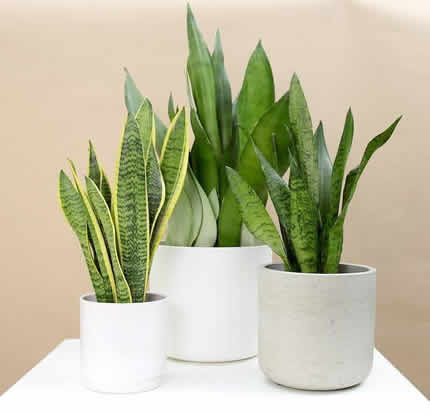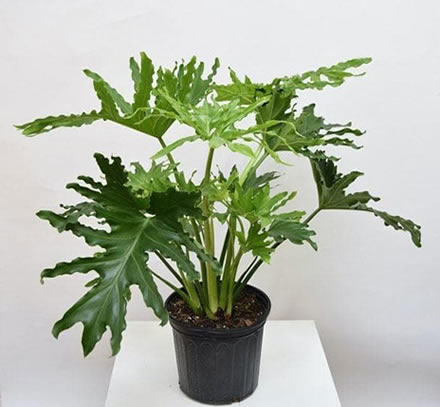Snake Plant vs Philodendron: Which One Is Better for Clean Air and Easy Living?

When choosing a houseplant that not only looks great but also helps clean the air, the Snake Plant and Philodendron are two strong contenders. Both are beginner-friendly, work well in low-light environments, and have been praised for their ability to remove toxins from indoor air.
But how do they compare when it comes to care, placement, design, and overall lifestyle fit?
Let’s dig in.
Table of Contents
🌬️ Air-Purifying Power
Snake Plant: A NASA-backed powerhouse, the Snake Plant filters toxins like formaldehyde, benzene, toluene, and xylene, and it continues to release oxygen at night — making it perfect for sleep spaces.
Philodendron: This leafy classic is also known for air purification, especially removing formaldehyde from indoor air. It’s not as aggressive in filtering as the Snake Plant, but still contributes to improved air quality through steady transpiration and leaf surface area.
💡 Verdict:
Snake Plant wins for all-around purifying strength and nighttime oxygen output.

📘 Related reads:
→ Snake Plant – Why the Snake Plant Helps You Sleep Better at Night
→ Philodendron – Nighttime Wellness Starts with a Philodendron in the Bedroom
Maintenance & Care Level
Snake Plant: Practically unkillable. It can handle drought, dark corners, and general neglect. Water every 2–3 weeks and avoid soggy soil.
Philodendron: Also easy to care for but prefers more regular watering and higher humidity. Some varieties trail, while others grow upright — but all like consistent moisture.
💡 Verdict:
Snake Plant is lower maintenance, especially in dry homes.
Philodendron is forgiving but slightly more water-dependent.
Product picks:
-
Self-watering ceramic pot for Snake Plant
-
Pebble tray or humidifier pairing for Philodendron
Pet-Friendliness
Snake Plant: Toxic to pets — ingestion can cause nausea, vomiting, and drooling.
Philodendron: Also toxic — contains calcium oxalate crystals that may cause oral irritation and GI distress in pets.
💡 Verdict:
Neither is safe for pets. Keep both out of reach if you share your home with cats or dogs.
Aesthetic & Design Impact
Snake Plant: Vertical, sleek, and structured. It fits modern and minimalist interiors, and adds bold punctuation to any layout.
Philodendron: Lush, cascading, or heart-leaved depending on the type. Great for hanging baskets, shelf draping, or softening a room’s edge.
💡 Design Tip:
-
Use Snake Plant to frame entryways, desks, or hall corners
-
Let Philodendron trail from shelves or spill from plant stands
Suggested pairings:
-
Matte black planter for Snake Plant
-
Brass or ceramic hanging planter for trailing Philodendrons
Best for Apartments, Offices, and Urban Homes
Snake Plant: Excellent for apartments with dry air, irregular light, and space constraints.
Philodendron: Best for medium humidity homes — especially bathrooms, kitchens, or rooms with filtered sun.
💡 Verdict:
Snake Plant is better for small, dry, or forgetful homes.
Philodendron suits cozier, damper spots with soft indirect light.

Symbolism & Soul
Snake Plant: A symbol of boundaries, resilience, and inner strength. It’s stoic, protective, and grounded.
Philodendron: Symbolizes heart energy, openness, and emotional healing. A nurturing and expressive plant with soul appeal.
💡 Choose based on what energy you want to invite:
-
Snake Plant = clarity and armor
-
Philodendron = softness and connection
🧭 Who Should Choose Which?
Choose the Snake Plant if:
-
You want a near-indestructible purifier
-
Your space has dry air or low light
-
You travel often or forget to water
-
You prefer upright, structured aesthetics
Choose the Philodendron if:
-
You love leafy, trailing foliage
-
Your home has moderate humidity
-
You enjoy a more emotional, flowing design energy
-
You want a softening, heart-centered presence in your space
Other Comparisons You Might Like
→ Snake Plant vs ZZ Plant – Which Cleans the Air Better?
→ Snake Plant vs Chinese Evergreen – Who Cleans the Air Better?
Thanks for reading! I'm Michael — houseplant fanatic and your Pinterest plant guide.
Follow me on Pinterest for fresh updates 🌿



